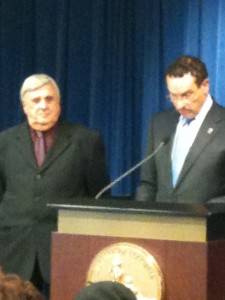LISTEN TO HAIMANOT BIZUAYEHU:
Audio clip: Adobe Flash Player (version 9 or above) is required to play this audio clip. Download the latest version here. You also need to have JavaScript enabled in your browser.
We’re not asking a favor. We are asking the Taxicab Commission to abide by the law. – taxi leader Haimanot Bizuayehu
“I’m sure at the end of the day he and I will be in the same place,” Mayor Vincent Gray said at a Sept. 7 press in response to a question about the different positions he and Ron Linton, the acting-chair of the D.C. Taxicab Commission, have on whether the Commission should hold a public hearing before voting on major changes to D.C.’s taxi regulations.
May 11, at the one hearing held on the proposed amendments to chapters 6 and 8 of Title 31, signs posted on the walls of the Taxicab Commission stated, “NO TELEVISION CAMERAS. NO VIDEO TAPING. NO AUDIO TAPING.”
“I want to underscore again, I believe in transparency,” Gray said. “People will not be excluded from these hearings or other proceedings associated with the Taxicab Commission.” But they have been, which is why Gray called on the Commission to hold a public hearing before voting on changes to the regulatory code.
At the Sept. 7 press conference, Linton declined, yet again, to call for an additional hearing, saying only that the matter would be considered. “When the matter comes before the Commission it’ll be on the agenda. The commissioners will have the option to either vote up, vote down, or… table [it],” he said.
So, the very commissioners who didn’t object to the barring of reporters on May 11 (or the arrest to two reporters at a public meeting on June 22) will determine whether they erred and if an additional hearing is warranted.
Gray has weighed in on the matter twice, not mixing his words either time. Aug. 17, when asked if the Commission would vote on the proposed regulations without holding another hearing, Gray said, “Simply put, not gonna happen.” Sept. 7, he went further, saying, “I’ve told you what my position is and I’ve imparted that to the chairman. I’m happy to impart that to the rest of the commissioners.”
Haimanot Bizuayehu is a taxi driver and organizer with The Small Business Association of DC Taxicab Drivers, a coalition of driver-owned companies and associations that represents more than 2,000 drivers. Bizuayehu responded to the mayor:
It’s a good thing for the mayor to say that he’s for an open, public hearing, and it looks like he recognizes that past Taxicab Commission meetings were not open, public hearings. But just saying that… is not enough because the mayor has to go further and ask the Taxicab Commission to abide by the laws.
… [The] Taxicab Commission, in its current form, is not legally constituted. The Taxicab Commission Establishment Act of 1985 clearly, clearly, clearly states that the Taxicab Commission will consist of nine people, three of whom [shall be] directly from the taxicab industry. [The] taxicab industry… is [defined as] people who have firsthand experience in the taxicab driving business. So [for] the Commission, which is not legally composed, to go ahead and do this major, major rulemaking process is not acceptable and, as far as we’re concerned, is illegal.
Monday, Mechal Chame, Derege Hailegiurgis and Ermias Wosenu delivered a petition in opposition to the proposed changes to the Taxicab Commission, signed by 1,104 licensed D.C. taxicab drivers. They were joined by ANC 8B Commissioner Darrell Gaston.
This is the second petition to chapters 6 and 8 that drivers have submitted. May 27, a dozen drivers attempted to submit the first petition, signed by more than 900 drivers, and the Taxicab Commission pushed them out, locked the doors, turned the lights out, called the police and referred to them as “a mob.”
In order to effectively address the issues facing D.C.’s taxicab industry, the Taxicab Commission must allow drivers to be a part of the process, which they haven’t been for years. Unfortunately, things are unlikely to improve under Linton, who has said that having industry representatives on the Commission, which is required by law, would be like “a dictatorship.”
In his six weeks as acting-chair, Linton has refused to meet with drivers, instead choosing to ensconce himself in his office, surrounded by the very people who have mistreated drivers. “It will be smart for Mr. Linton to meet with driver representatives and get the information from this side,” said Bizuayehu. The taxi leader continued:
If he continues being educated about the industry from one side, it will be a recipe for [a] hostile environment in the taxicab industry because drivers are hurting. Drivers have the lowest fare structure in the nation. Drivers are being abused by hack inspectors… We are not asking a favor. We are asking the Taxicab Commission to abide by the law. Period. Nothing else. So it will be appropriate for Mr. Linton to hear from both sides. That, in turn, will help not only the Taxicab Commission, not only the drivers, but the taxicab industry as a whole.
Related Stories:
- In Defiance of Mayor, New Taxi Chair Continues with Past Practice, 8/21/11
- Transparency, DCTC Style: “NO TELEVISION CAMERAS. NO VIDEO TAPING. NO AUDIO TAPING, 5/11/11
- It’s Time to Inspect D.C.’s Hack Inspectors, 6/23/11
- Gray Names New Taxicab Commission Chair, 7/31/11

